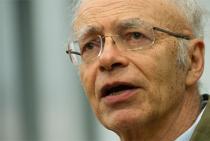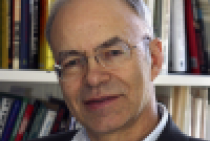Hamas’s brazen and vicious attacks within Israel have rightly drawn condemnation from around the world. If this is a war, as both sides agree it is, then Hamas’s deliberate targeting of civilians counts as a major war crime. But the brutality demonstrated by Hamas did not emerge in a vacuum. The lesson of what is currently happening in Israel and Gaza is that violence breeds more violence. The last real chance of avoiding the tragic conflict being waged between Israel and Hamas was destroyed by a single killing: the assassination of Israeli Prime Minister Yitzhak Rabin in 1995. The assassin was not a Palestinian militant, but an Israeli extremist opposed to the Oslo Accords for peace. The great beneficiaries of the assassination were Israeli nationalists, above all Binyamin Netanyahu.
You are here
Results for ethics
Thursday 12 October 2023
Princeton, USA
Thursday 6 January 2022
Melbourne, Australia
There has been considerable opposition to vaccine mandates – opposition that I have argued is misguided. When both a vaccinated and an unvaccinated patient with COVID-19 need the last available bed in a hospital’s intensive care unit, the vaccinated patient should get it. Those who view vaccination as a “personal choice” need to bear personal responsibility for choosing to place others’ lives at risk. Exceptions should be made for those few patients for whom vaccination is contra-indicated on medical grounds, but not for those who claim to have religious grounds for exemption. No major religion rejects vaccination, and if some people choose to interpret their religious beliefs as requiring them to avoid vaccination, then they, and not others, should bear the consequences. By Peter Singer
Thursday 5 August 2021
Melbourne, Australia
Laws requiring people to be vaccinated if they are going to be in places where they could infect other people are restricting one kind of freedom in order to protect the freedom of others to go about their business safely. Car crash survivors who were injured because they were not wearing seat belts recognize and regret their irrationality – but only when it is too late. We are now seeing a very similar situation with vaccination ...too many people make decisions that they later regret. They cry. And they say they didn't know. By Peter Singer.
Monday 10 August 2020
Melbourne, Australia
Many ethicists conclude that fully informed volunteers should be allowed to sign up for a potentially dangerous trial that will reduce the time required to bring an effective vaccine to everyone who could be exposed to SARS-CoV-2. The alternative is that the virus will continue to impose much higher levels of risk on other people, especially health care workers, older people, and people with underlying health conditions that reduce their chances of surviving infection. We should praise the young and healthy volunteers for risking their safety in order to save others. By Peter Singer and Isaac Martinez
Tuesday 7 January 2020
Melbourne, Australia
We can begin with the presumption that it is wrong to take human life. President Donald Trump won’t deny that. A year ago, for example, he said: “I will always defend the first right in our Declaration of Independence, the right to life.” Trump was addressing his remarks to anti-abortion campaigners, but a right to life that applies to fetuses must also apply to older humans. Is there an exception for “bad guys,” though? Was the double assassination at Baghdad International Airport ethically defensible? - Peter Singer
Tuesday 2 July 2019
Wellington, New Zealand
Wherever one looks – the media, political leaders’ rhetoric, or online discussions – one finds a bias toward bad ideals. This is not to suggest that we (or most of us) endorse, say, racism, misogyny, or homophobia, but rather that we grant them efficacy. We believe that extremist ideals must be combated, because we implicitly consider them potent enough to attract new adherents, and contagious enough to spread. At the same time, we tend to take positive ideals less seriously. By Nicholas Agar.
Tuesday 13 November 2018
Princeton, USA
The murder of Jamal Khashoggi in Saudi Arabia’s Istanbul consulate on October 2 has focused attention on the Saudi regime. And yet the strong response to Khashoggi’s brutal murder stands in stark contrast to the relative indifference the West has shown to the vastly larger number of victims of the Saudi-led military intervention in Yemen. Saudi airstrikes have killed thousands of civilians, including children who died when school buses were bombed. Now those deaths are themselves heavily outnumbered by the toll of the widespread famine engulfing Yemen “much bigger than anything any professional in this field has seen”. By Peter Singer.
Wednesday 3 October 2018
New York, USA
Does human nature exist? The answer has implications for anyone concerned about ethics. In an era defined by amoral political leadership and eroding social values, thinking about the essence of humanity has never been more important....Views on human nature affect views on ethics. And today, our ethics are a mess. By Massimo Pigliucci.
Wednesday 13 December 2017
Princeton, USA
A Saudi prince has been revealed to be the buyer of Leonardo da Vinci's "Salvator Mundi," for which he spent $450.3 million. Had he given the money to the poor, as the subject of the painting instructed another rich man, he could have restored eyesight to nine million people, or enabled 13 million families to grow 50% more food. - Peter Singer.
Monday 17 July 2017
Princeton, USA
When Americans are asked what percentage of US government spending goes to foreign aid, the median answer is 25%. The correct answer is 1%. No wonder, then, that when President Donald Trump justifies cutting aid on the grounds that other countries need to step up because they are not paying their fair share, many people believe him. By Peter Singer.











